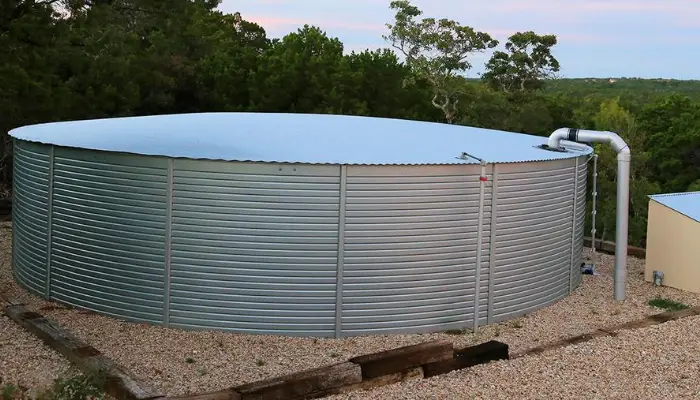Managing a farm can be a challenging task. Apart from sowing and harvesting crops in the right season, farmers also have to take care of many other requirements. Whether it is maintaining equipment, saving crops from pests or ensuring an uninterrupted water supply, farmers need to handle everything to ensure the quality of their harvest.
As water plays an important role in farming, not having continuous access to water can be a big problem for crops. Lack of water can also affect animals living on the farm and disturb the farming schedule. Although rainfall is fairly distributed throughout the year in the UK, due to changing weather conditions, farmers have been struggling with dry spells and droughts during the summer months in recent years. For this reason, many farmers prefer to install water tanks on their farms.
Good quality, large volume water tanks can be a valuable investment for a farm. It not only helps farmers with storing clean water but also ensures the smooth functioning of the farm throughout the summer. However, as there are many different water tanks on the market, choosing the right tank can be difficult. To help you make a decision, this guide that will assist you in selecting the right water tank for your farm.
1. Know your requirements
Water is an essential element for the survival of all living things. Whether you have a large farm, a small barn or just a shed, having a water tank is a must to store clean water for everyday use. As water storage tanks are available in different shapes, sizes, colours and materials, it is important to understand your requirements before purchasing a tank. While many people can estimate their requirements, others may need help with their decision. The experts at Tanks For Everything can help you understand the different factors that need to be considered before buying a water tank for your farm, and help guide you to the best options.
2. Location of the water storage tank
The location of the water tank can be an essential determining factor in your purchase. If you want to install a tank above ground, you will have to check for water tanks that are impact-resistant, rust-proof, UV resistant and easy to clean. On the other hand, if you want a below-the-ground water storage tank, then it must be corrosion-proof and impermeable.
3. Check the number of layers
Water storage tanks often have multiple layers. These layers protect the tank from the sun and climatic changes. To check the number of layers of a tank, you can simply lift the lid and count the number of edges inside it. Most of the time, you will find tanks with 3, 4 or 5 layers. The more layers, the better tank’s ability to resist cracks and withstand environmental stress will be.
4. Decide the size of the water tank
Based on the customer’s requirements, water tank manufacturers offer storage tanks in different sizes. From a few hundred litres to several thousand of litres, you will find a number of water storage tank options available. Whether you are looking for a large tank to meet all your irrigation needs or just a small tank to save some extra water, buying the right size of the tank will help to ensure that you never run out of water.
An ideal way to decide the size of your water tank is by finding out the volume of water that you will need during the drier months. Depending on the amount of water you need every day or week, you can identify your monthly usage. For example, if you use 1000 litres of water every week to water your crops, then your monthly usage will be around 4000 litres. In addition to this, you might need extra water for your farm animals and for washing farm equipment. Calculating the total consumption of water for different purposes will assist you in identifying your exact requirement.
5. Check your source of water
In the UK, main supply, rainfall and abstract water are the common sources of water used on farms. Although many farmers also use private boreholes, recently, agricultural rainwater harvesting has become a common practice in the UK. Compared to boreholes or chlorinated water, rainwater is naturally soft and can be a great source of nutrients for many crops and livestock. Depending on your preferred water source, you can check the type of storage tank that will be suitable for you.
For example, investing in a rainwater harvest tank can be a good option for you if you have a big farm and rainwater is your only source of water. These tanks can hold large volumes of water in the range of 1350 to 20000 litres. This will make it easier for you to use water to irrigate your farm. Furthermore, before investing in a rainwater harvest storage tank, you will also have to identify the average amount of rainfall you receive every year. Knowing the pattern of rainfall will tell you the amount of rain you can expect and the volume of water that can be stored.
6. Consider the material of the tank
Even though water tanks come in different materials such as steel, fibreglass and plastic or polyethene, a majority of farmers prefer tanks made of plastic. This is because plastic tanks are more durable and can resist the harsh weather conditions on farms. Moreover, plastic tanks can be quickly installed and easily transported on a trailer. However, there are different varieties of plastic tanks. For example, you might find clear plastic tanks or in white or black colours. As clear and white plastic tanks are less efficient in blocking the UV radiation, they degrade quickly and you might find algae growing inside the tank. On the other hand, dark colour tanks are sturdy and can be installed at a place with direct exposure to the sun.


